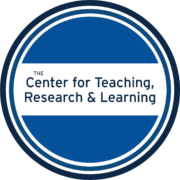Jane E. Palmer, Ph.D., M.S.W. (SPA: JLC)
What research methods course(s) do you teach?
I regularly teach Intro to Justice Research Methods, an undergraduate course in SPA. From 2014 – 2021, I taught the Community-Based Research course for the Commun ity-Based Research Scholars program and undergraduate certificate in community-based research. I have also taught Public Program Evaluation, Qualitative and Survey Methods, and an online graduate research methods course that focuses on critical consumption of statistics and data analysis in Google Sheets.
ity-Based Research Scholars program and undergraduate certificate in community-based research. I have also taught Public Program Evaluation, Qualitative and Survey Methods, and an online graduate research methods course that focuses on critical consumption of statistics and data analysis in Google Sheets.
How long have you taught the course(s)?
I have taught a research methods course almost every semester since I started as a full-time faculty member in 2013.
How would you describe your approach to teaching research methods?
My approach to teaching research methods is experiential. I organize my Justice Research Methods course so that on Mondays we discuss the readings associated with that week’s topic and on Thursdays we do a “lab” where they learn to apply the method. This might look like sending my students to [MGSC] during class to conduct surveys or participant observation or training students to conduct a mock focus group with their peers (complete with other students role playing challenging focus group participants).
The experiential component was a given when I taught community-based research. I would line up a community partner in advance and we would collaboratively plan out a project that would benefit the partner could be conducted in a semester’s time. I would assign my students roles (or let them pick their roles) as if we were a research team on a big grant. Our final exam would be a report and presentation at the non-profit to share the results of the study.
What is your favorite part about teaching a research methods course?
I love designing the experiential activities and inspiring my students to love research. I also love the conversations about critical consumption of data and teaching them how to know whether a statistic is trustworthy. I also love sharing my stories of good, bad, and ugly research projects that I have been a part of and the lessons learned along the way. I also love leading my mid-semester and end-of-semester “pub trivia” review sessions where teams compete for candy or swag and extra credit points.
Are there any resources (general or domain specific) that you have found helpful in teaching?
I also recommend incorporating YouTube videos or guest speakers so students can see or hear about research project implementation and how it differs from the ideal scenarios that are outlined in the textbook.
What is your favorite teaching text to use?
For my JLC research methods class, I use a textbook by Ronet Bachman and Russell Schutt. I selected it because I know Ronet and trust her. I have also used Joel Best’s Damned Lies and Statistics and a book called Sex, Drugs, and Body Counts: The Politics of Numbers in Global Crime and Conflict.
What tips/recommendations would you give to an instructor teaching a research methods course for the first time?
I recommend talking to colleagues who teach research methods to crowd source ideas. I also recommend considering how to make the course as interactive or experiential as possible because students learn by doing. Lastly, have them do the CITI certification as an assignment when you go over Ethics and tell them to put it on their resume!

AU's Center for Teaching, Research & Learning ©
A Unit of the Office of the Provost
American University, Washington, DC
Get in touch!
Address: Hurst 214
Phone: 202-885-2117
Email: ctrl@american.edu
